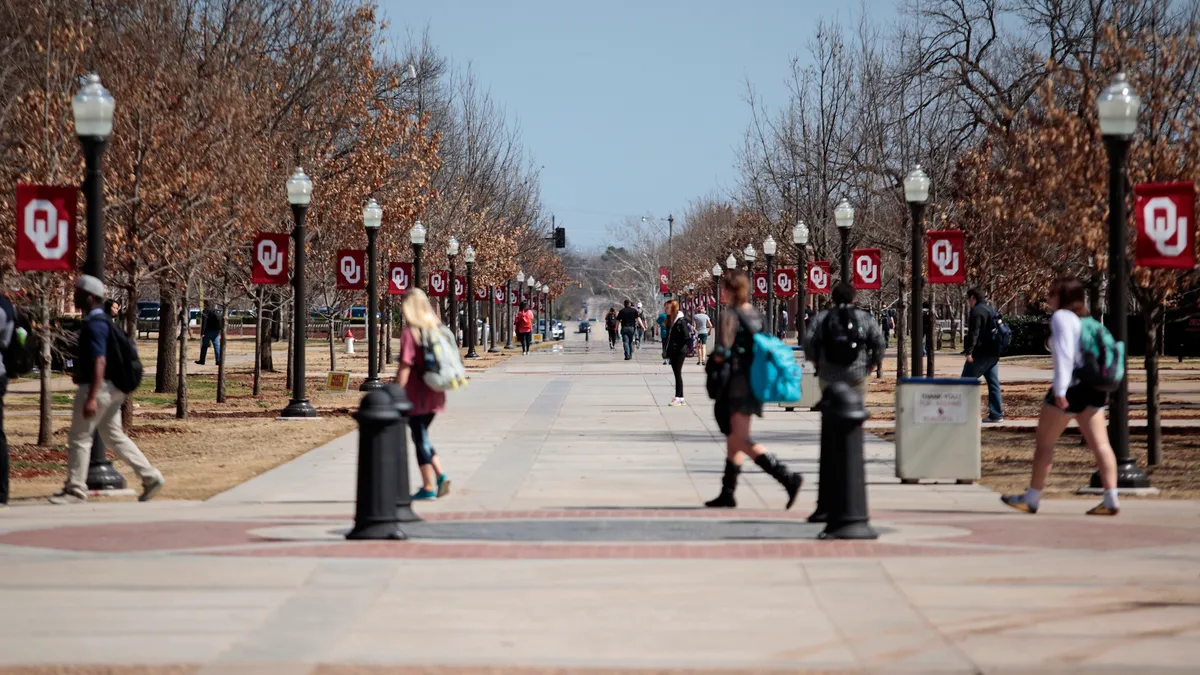The University of Oklahoma is getting pushback from civil rights groups over its interpretation of a recent executive order affecting the state's diversity, equity and inclusion programs.
Last week, Oklahoma Gov. Kevin Stitt ordered public colleges to review all of their diversity, equity and inclusion-related programs and jobs. If needed, colleges must eliminate ones that are “not necessary for compliance, accreditation, or student and employee support services intended to support success broadly."
Later that day, the University of Oklahoma said that the order will force the university to eliminate all of its diversity offices.
Now, civil rights organizations are calling into question the university's "apparent leap to eliminate all DEI offices."
"As dangerous as this Executive Order is, only a handful of sentences apply to universities, and they do not require that universities eliminate DEI programs," the American Civil Liberties Union contended in a statement Tuesday.
University of Oklahoma’s response
University of Oklahoma President Joseph Harroz Jr. said the executive order “evokes deep concern” in a public letter Dec. 13.
"Today, Oklahoma’s governor signed an executive order eliminating offices of Diversity, Equity, and Inclusion at all public higher education institutions in Oklahoma, including our own," he said. "Though we are obligated to comply with the governor’s executive order, we will remain committed to ensuring an education from the University of Oklahoma remains accessible and available to all."
But the ACLU of Oklahoma called into question Harroz's assertion that it left the university with no formal DEI infrastructure.
"Exceptions and limiting language appear throughout the order, leaving universities with ample room to continue the necessary work of DEI, if they have the will to do so,” the chapter said in conjunction with the national ACLU.
The Lawyers’ Committee for Civil Rights Under Law, a civil rights organization, and Schulte Roth & Zabel, a law firm, co-signed the statement.
"For the sake of Oklahoma’s students, we urge OU to change course, resist this Executive Order, and fight to preserve its DEI programs," the groups said.
The University of Oklahoma did not respond to a request for comment Wednesday.
Meanwhile, Oklahoma State University gave a markedly different response to the order.
“While we will ensure we meet our legal obligations, an initial review indicates that no significant changes to our processes or practices are needed,” Oklahoma State University President Kayse Shrum said in a statement to local news outlets.
The ACLU letter urged all of Oklahoma's colleges to carefully read the executive order rather than jumping to conclusions about its content.
The order's legal standing
In addition to reviewing DEI initiatives, Stitt's order prohibits colleges from requiring anyone to disclose their pronouns or mandating that prospective employees include diversity statements in their applications.
DEI statements explain job candidates’ experiences with and commitment to diverse populations. They have increasingly been targeted by conservative policymakers and free speech advocates, who often describe them as loyalty oaths.
Public colleges are expected to comply with the governor's order by the end of May.
“Encouraging our workforce, economy, and education systems to flourish means shifting focus away from exclusivity and discrimination, and toward opportunity and merit," Stitt said in a statement last week. "We’re taking politics out of education and focusing on preparing students for the workforce.”
He delivered his press conference from a lectern reading "Defunding Discrimination."
Stitt is just the latest Republican state leader to attack DEI programming.
Conservative calls for reviews of DEI initiatives often portend their rollback. In Iowa, a new law directing the state’s board of regents to review its DEI efforts prompted it to cut all campuswide diversity and inclusion work not required for legal or accreditation compliance.
However, the ACLU questioned Stitt’s legal argument for his executive order.
During Stitt’s press conference, he said the U.S. Supreme Court ruled against racial discrimination, referencing its June decision to strike down race-conscious admissions. The order also cites the 14th Amendment, which gives citizens equal protection under the law.
"Despite the governor’s selective citations, neither the U.S. Constitution nor Supreme Court caselaw support his executive order," the ACLU said.
The June court ruling applied specifically to admissions, though some colleges have proactively extended the reasoning to scholarships and other student programs.
Stitt's reading of the decisions is "dangerously overbroad and incorrect," the ACLU said. His citation of the 14th Amendment comes with "painful irony," the organization added, as it was implemented following the Civil War to protect Black Americans from discrimination.
The governor's office did not respond to a request for comment Wednesday.






















